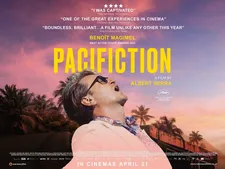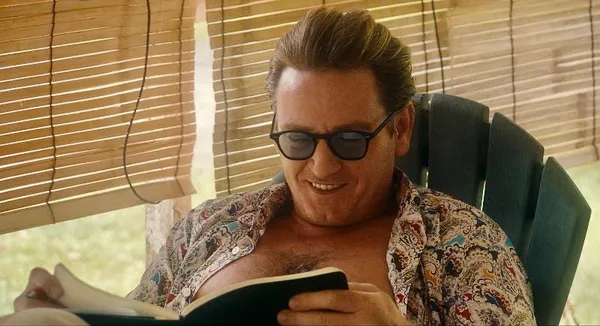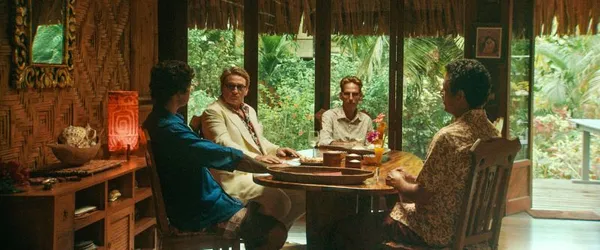Actors either love or hate working with Catalan director Albert Serra, who creates his own special worlds on the set as he shoots. He knows that he puts his cast under a lot of pressure but that’s part of the deal when they sign on.
Whatever the recipe, clearly it can work in an actor’s favour. Benoît Magimel, star of the director’s latest Pacifiction, shot in Tahiti, won best actor César for the second year in a row for his performance as France’s High Commissioner who is charged with investigating whether rumours of French nuclear testing in the area are true. The strikingly shot film also won a best cinematography award for Artur Tort.
Serra relishes his reputation as a hard task master as well as his esoteric style of filmmaking, which first received recognition with his debut feature Honour Of The Knights (a free adaptation of Don Quixote played by non-professional actors from his village Banyoles) which was presented at the Cannes Directors’ Fortnight in 2006. Other markers on his upwardly mobile trajectory include the Golden Leopard he received in Locarno for Story Of My Death, inspired by Casanova’s memoirs; The Death of Louis XIV starring Jean-Pierre Léaud as the Sun King, (presented in the Official Selection of Cannes Film Festival in 2016) and Liberté, starring Helmut Berger, Marc Susini, and Baptiste Pinteaux, the cinematic recreation of his 2018 Berlin Volksbühne play of the same name, which won the Special Jury award at the 2019 Un Certain Regard selection in Cannes.
He returned to Cannes last year with Pacificition, presented in the Official Selection. Serra described Magimel as “very rock ’n’ roll.” He added: “He was very brave in his attitude. There was only one golden rule that is important to me: an actor cannot stop the scene or talk to me. He has to be there and if he is tired he can sit down. But he must never talk to me, look at the camera or stop: he has to keep going. I can shoot for 45 minutes without saying anything to the actors. They are under pressure with three cameras being used and a lot of things happening. They have to accept it even if it feels a bit strange and uncomfortable. It is not an obvious way of working and I expect them to do it without complaining. Magimel accepted it for the whole shooting. And in return he was quite helpful.”
His cast are thrown into the unknown every day. “It’s like a live performance. I like to keep the shooting short for that reason - here it was just 24 days of shooting. Everybody had to be ready every day. I like to pay attention to something that is forgotten in a lot of cinema today: that is the inspiration of actors. There is huge difference between an inspired actor and an actor who that particular day is not inspired. With digital cameras you can capture a lot of things that are out of the control of the actor. That intrigues me.”
Originally the idea of Pacifiction was that it would take place in France. Serra was unconvinced. “Yet, I didn’t want to film in Paris, the banality and dreariness of mainland bourgeois France with its streets and its cafés… I wanted something different, I wanted to go somewhere far away. Why not the French overseas territories? Little by little, a subject emerged, and I wrote a complete screenplay that is quite traditional in its construction. Contrary to what people might think, I enjoy writing screenplays. This one, in particular, is inspired by Tarita Tériipaia’s memoirs.
"Tarita was married to Marlon Brando for 10 years. They’d met while filming Mutiny On The Bounty (1962), in which she had one of the leading roles. In her memories, she talks about her life with the actor, but also about her childhood. I found the contrasts that she brought up very interesting, first of all between the pure innocence of her childhood in Papeete and the sometimes noxious presence of the Westerners, secondly between this pristine paradise on earth and the arrival of a Hollywood filming crew. The rapport between an ideal paradise and actual corruption, but also between a certain reality and cinema’s make believe appeared rather inspiring to me…”
 |
| Pacifiction poster Photo: New Wave |
Never one to rest on his laurels Serra is in the throes of what he describes as “an impressionistic documentary.” He elaborates: “I want to explore bullfighting from the tormented perspective of the man in the ring. Bullfighting is one of the most excessive examples of the primitive origins of Southern European civilisation. It has a kind of showmanship on the edge of being art, and I like that idea. I like the violence of it. I like the pressure.
“The film is about the spiritual pain of the torero. Of course we know about the animals’ suffering, but the humans involved suffer as well. I’m more focused on that than on the social debate about the practice.”
Pacifiction is released in the UK and Ireland through New Wave. Serra in Focus at London ICA from 19 to 27 April and in conversation at London Ciné Lumière on 20 April supported by Embassy of Spain and Instituto Cervantes. You can read more details of where the film is screening on the New Wave website
























